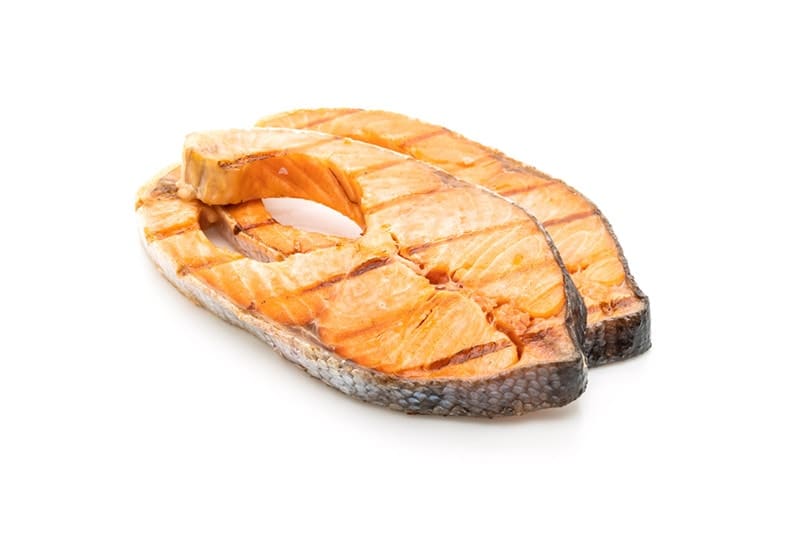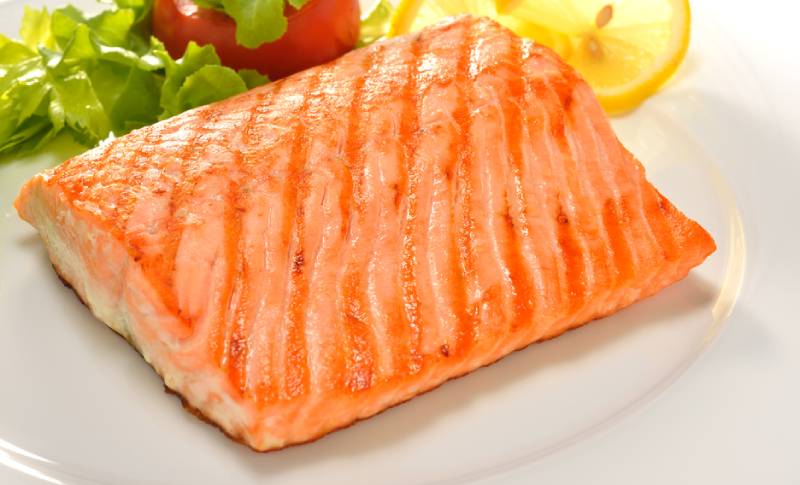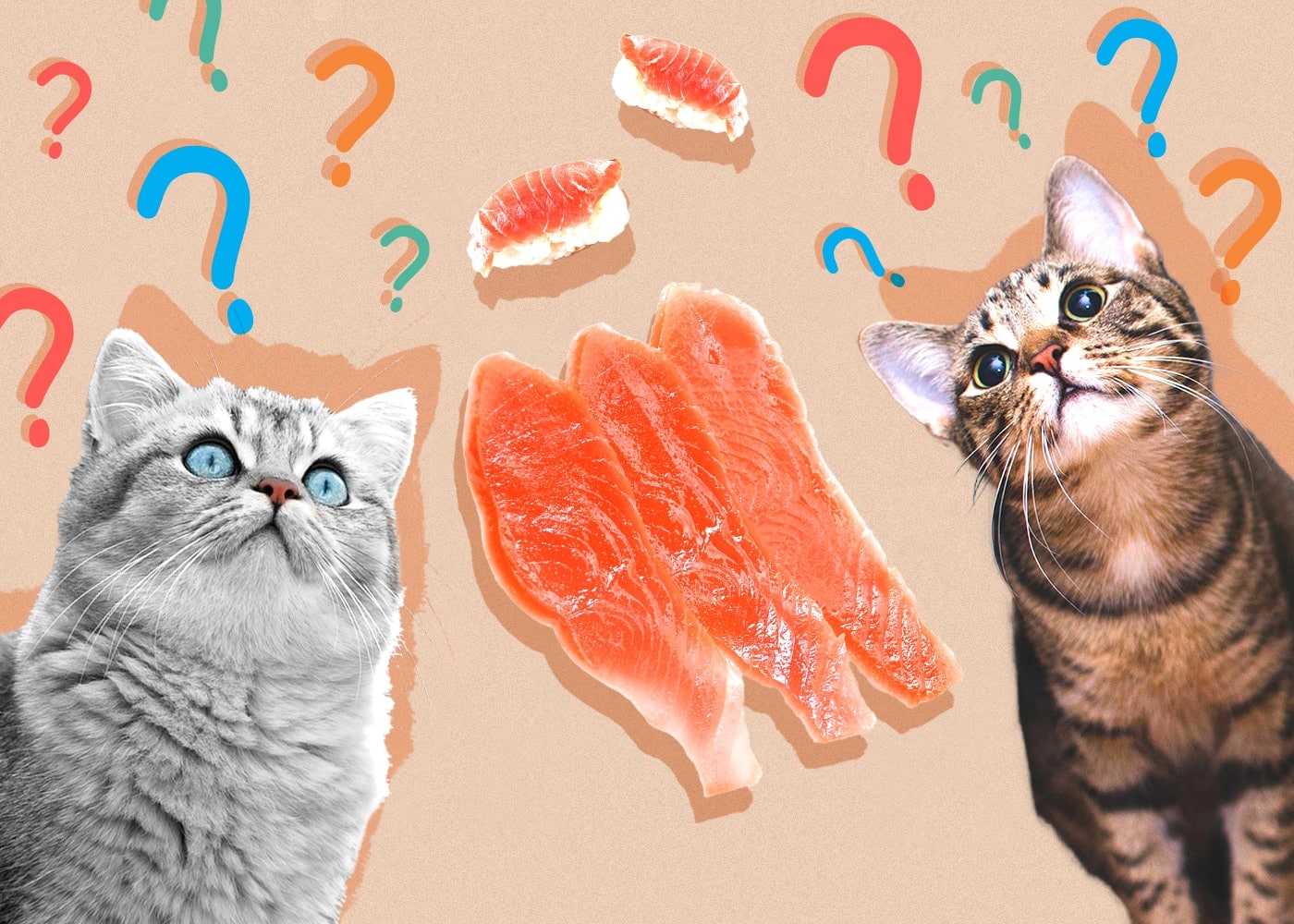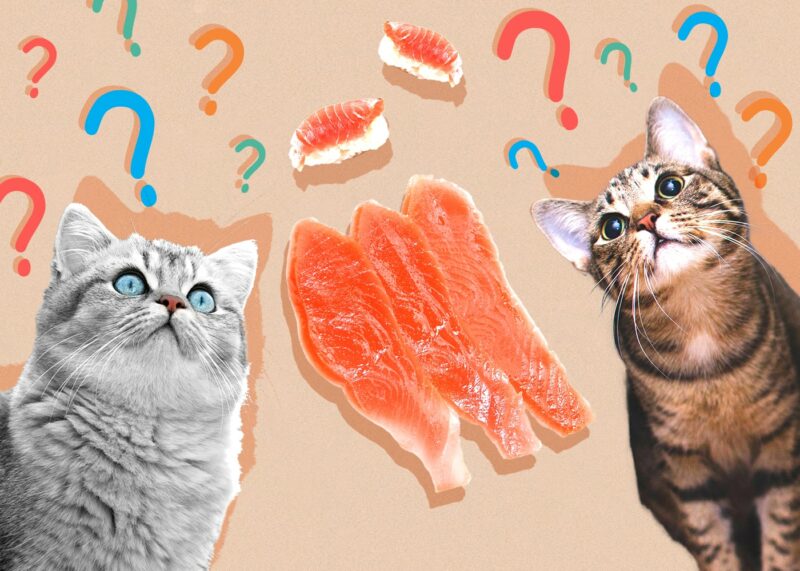Cats love fish, right? Cartoons often depict a cat with a fishbone in paw and licking their lips! But that does not mean that they should eat it all the time. Before you jump in headfirst with the kitty salmon consumption, there are a few things that you need to know about your feline and this fish.
The quick answer is yes, cats can eat salmon, but only in moderation. While salmon is known to be beneficial for us humans for a variety of reasons, too much salmon can be harmful to your cat. Also, cats cannot eat all types of salmon.
With so much information available online, it is often hard to know exactly what the truth is and what information is a little fishy, so here in this guide, we set the record straight.
Can Cats Eat Salmon?
Cats can eat salmon, but they cannot eat all types of salmon, and they should not eat too much of it either. The reason that cats go wild for fish is because of its strong smell, and if you’ve ever started preparing a fishy dinner for yourself, you’ve probably found your kitty not too far away.

Salmon will not provide your cat with all the nutrients that they need, so salmon should never be the only ingredient in their diet, nor should it replace their balanced meals completely. Ideally, feeding your kitty one salmon meal a week or a sprinkling of salmon over their usual meal twice or three times a week would be beneficial, but it should never be more than 15% of their total diet.
If you would rather use it as a small daily treat instead, that’s fine; a pinch of salmon once a day will show them how much they mean to you, and they will go wild for it. But do not go overboard with the salmon because they might become accustomed to it, and they won’t want anything but that.
But Not All Cats Can Eat Salmon!
You might be surprised to learn that fish allergies in cats are quite common. For this reason, if you are feeding salmon to your cat for the first time, be sure to feed them just one bite, and watch them for 24 hours for any side effects.
The most common signs of food allergies in cats are itchy skin, persistent scratching that causes sores, and areas without fur. Some cats may also experience vomiting and diarrhea. If you notice any of these signs, speak to your veterinarian, and do not feed salmon to your cat again. Keep in mind that it is common for ingredients that were previously tolerated to suddenly start triggering allergies, which is why it is important to always be observant of your pets.
Now let’s take a look at the different types of salmon that your cat can eat and the ones that they shouldn’t.
Cooked Salmon Only, Please
Raw salmon can carry and transmit parasites, so always cook this fish before offering it to your cat. You must also ensure that all the bones, including the spine, are removed. Ideal cooking methods are baking, smoking, grilling without adding additional oils, or boiling. Cats can even eat the salmon’s skin; just make sure it is cooked through and flakey.
Remember, don’t feed your cat any salmon scraps off your plate because you might just forget that you added sweet chili sauce or even worse, toxic pieces of garlic, and that will not go down well!.
Canned Salmon
This is the most convenient way to feed salmon to your kitty, but not all canned salmon is good for cats. Some versions are full of sodium or have excessive oils or other additives that will be harmful to their digestive system. Choose only canned salmon that is preserved in water if you wish to feed it to your cat.
Raw Salmon
This is a big no! Raw salmon, while tasty for us, can contain harmful parasites and bacteria that can cause food poisoning and other issues in your kitty. For this reason, this fish always needs to be cooked.
Smoked Salmon

Salmon Nutrition
Eating a bit of salmon as a treat once or twice a week is not only great for your cat’s taste buds, but it also has a variety of nutritional benefits.
Omega 3 Fatty Acids
Omega-3 fatty acids are beneficial for many reasons. They will nourish your cat’s skin from the inside out and make their coat super healthy and glossy, and they will also aid in their brain function and eye health.
Omega-3 fatty acids also support your cat’s bones and joints, and with all the jumping that they do, cats need as much joint support as they can get. Additionally, arachidonic acid is an omega-6 fatty acid, and it is essential for felines, and salmon is a great source of this.
Vitamin B12
Unlike other needed nutrients, cats cannot produce their own vitamin B12, also known as cobalamin. Salmon contains a good amount of vitamin B12, and it is beneficial for your cat’s immune system, nervous system, and cognitive function, and it also supports a healthy gut flora.
Vitamin B6
Cats have a higher requirement for vitamin B6, also known as pyridoxine, compared to most other animals because they are known to have a high protein requirement, and vitamin B6 helps metabolize fat and protein.
- NO MESS - The 360° tray on this cat food and water bowl set has a raised design to catch and...
- WHISKER FRIENDLY - Shallow and wide metal containers with flat bottoms ensure your kitty can enjoy...
- CHEW-SAFE MATERIALS - Kittens and cats love chewing on silicone and soft rubber - but it's a choking...
Learning about what your cat can and cannot eat is a crucial part of keeping them happy and healthy! Choosing a bowl to serve cat-friendly foods in is another important decision pet owners face. Satisfy the specific needs of your cat with the innovative design of the Hepper NomNom Cat Bowl. Learn why it’s our (and our cats!) favorite food and water dish here.
At Catster, we’ve admired Hepper for many years and decided to take a controlling ownership interest so that we could benefit from the outstanding designs of this cool cat company!

Final Thoughts
Salmon, like most things in life, is best eaten in moderation. It has a lot of health benefits for your kitty, such as a healthy coat, support for eye and cognitive function, vitamin absorption, and support for bones and joints.
Be sure that you don’t feed your cat too much salmon, because in addition to all the reasons outlined here, they might become seriously stubborn for it, and we all know our kitties could do without the extra sass.
You might also like:
- Can Cats Eat Olive Oil? Vet-Approved Nutritional Facts & FAQ
- 7 Natural Home Remedies to Stop a Cat From Licking Everything
Featured Image Credit: Unsplash, Pexels












